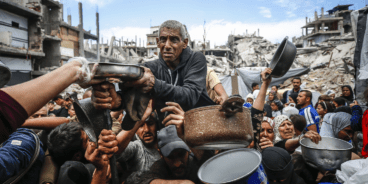
Atrocity Alert No. 41: Iraq, Yemen and Philippines
Atrocity Alert is a weekly publication by the Global Centre for the Responsibility to Protect highlighting and updating situations where populations are at risk of, or are enduring, mass atrocity crimes.
Iraq
On 29 January reports emerged that the Iraqi provincial government in Salah ad-Din governorate had enacted a new policy of evicting families accused of ties to members of the Islamic State of Iraq and the Levant (ISIL) from their homes. At least 345 families in the city of Tikrit have been sent to Al-Shahama camp for displaced persons outside the city, while another 200 families are reportedly being held in a school and at Rubaidha camp. Several of those forcibly displaced reported that Iraqi Security Forces (ISF) had demolished their houses because of a family member’s alleged ties to ISIL.
Local authorities have said this policy of collective punishment is intended to force members of ISIL to pay a personal price for joining the organization. However, Iraqi Prime Minister Haider Al-Abadi has criticized the policy. The targeting of civilians who have taken no active part in hostilities, including the families of terrorists, is illegal under international law. As the ISF continue their military offensive against ISIL, the government must actively prevent reprisals against Sunni civilians and pursue accountability for human rights violations committed by all parties to the conflict.
Yemen
Despite efforts by the UN Special Envoy to Yemen, Ismael Ould Cheikh Ahmed, to encourage parties to the conflict to recommit to peace negotiations and a ceasefire, fighting between Houthi rebels and pro-government forces has escalated in southern Yemen. On 31 January the UN Humanitarian Coordinator in Yemen, Jamie McGoldrick, raised concerns regarding civilians fleeing violence in Al Mokha and Dhubab, in Taizz Governorate, calling upon all parties to meet their obligations under international humanitarian law. As many as 30,000 people remain trapped in Mokha, where civilians have been killed by airstrikes, shelling and snipers. Fighting also continues in northern Yemen along the border with Saudi Arabia.
On 27 January the UN Panel of Experts for Yemen submitted their annual report to the UN Security Council, documenting attacks by the Saudi-led military coalition that “may amount to war crimes.” The report reminds all members of the coalition and its allies of their responsibility to uphold international humanitarian law.
Philippines
Over 7,000 people have been extrajudicially killed in the Philippines as a result of a seven-month “war on drugs” initiated by President Rodrigo Duterte. On 1 February Justice Secretary Vitaliano Aguirre II responded to evidence that the killings amounted to crimes against humanity by declaring that drug offenders are not “part of humanity.” On 31 January Amnesty International reported on the role of police and armed vigilantes in extrajudicial killings. To date no police have been held accountable for their actions.


Atrocity Alert No. 443: Sudan, Israel and the Occupied Palestinian Territory and United States Travel Ban
